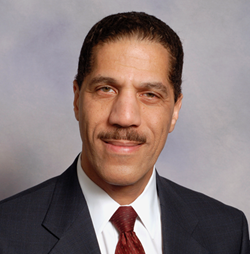
2015 Kirklin Award Winner Announced
It was with great pleasure that the American Association of Surgical Physician Assistants announced at their 2015 CME meeting that Michael L. Powe, Vice President, Reimbursement & Professional Advocacy for the American Academy of Physician Assistants was this year’s recipient of the John W. Kirklin Award for Professional Excellence.
The John W. Kirklin, M.D. Award for Professional Excellence was established in 1985 by the American Association of Surgeon’s Assistants, now the American Association of Surgical Physician Assistants. The award was established to honor John W. Kirklin, M.D. for his pioneering work in establishing the surgical physician profession. Dr. Kirklin is considered the founding father of the surgical physician assistant. He started the first surgical assistant program in 1967 at the University of Alabama with his wife Margaret Kirklin, M.D. two years after Eugene Stead founded the first physician associate program at Duke University. Dr. Kirklin was a world famous cardiovascular and thoracic surgeon recognized by over a dozen honorary memberships within prestigious national and international surgical associations, past president of the American Association for Thoracic Surgery and past editor of the Journal of Thoracic and Cardiovascular Surgery. As the chair of the Department of cardiovascular and thoracic surgery at UAB at the time when referring physicians were expected to first assist the surgeon. He recognized and envisioned an assistant to the surgeon not just in surgery, but also in all areas of clinical care of the surgical patient. Dr. Kirklin convinced not only UAB but also his surgical colleagues of the need for a highly specialized surgical assistant convincing the American College of Surgeons of the value and gaining their support.
John W. Kirklin, M.D. received an award of professional excellence in 1985 from the American Association of Surgeon’s Assistants recognizing him as the founding father of surgical physician assistants. With his permission, his name has been added to the award.
This prestigious award has been reserved for those members of the surgical physician assistant profession or someone who has made a significant contribution to the surgical physician assistant profession. It has been awarded 20 times in the past 29 years. The award is reserved only for those who have proven their devotion to the surgical physician assistant profession by service and sacrifice having contributed to promoting the profession over an extended period of time.
Mr. Powe is also the AAPA’s staff liaison to the AMA’s CPT Editorial Panel and the Relative Value Update committee evaluating the Medicare payment process. He is the author of the book, Essential Guide to PA Reimbursement, and an adjunct assistant professor at the George Washington University School of Medicine and Health Sciences in Washington, DC.
Michael has a long history of working tirelessly with the physician assistant profession in his years with the AAPA and the board and members of AASPA congratulate him on this well-deserved award.
Past Recipients
The first John W. Kirklin, MD Award was given to Charles Watkins in 1986. There were seven consecutive awards given out through 1992 to Jacqueline B. Hall, Dana R. Gray, John F. Byrnes, Jr., Douglas D. Condit, David J. Bissonette and Joseph Cooper. Following a five-year hiatus, Gerald Simons became the eighth recipient in 1998, John Y Lee in 1999, Cathy Dunning in 2000, Clara Vanderbilt in 2001, Susan Lusty, publisher of Surgical Physician Assistant journal became the 12th recipient in October 2002, Bob Blumm in 2005, LaWuan Hance and Diane Jones, co-winners in 2006, Charles Kock in 2007, Dan Vetrosky in 2008, Steve Wilson in 2008, Roy Constantine in 2010, Robert Sammartano in 2012 and Michael Powe in 2015.

